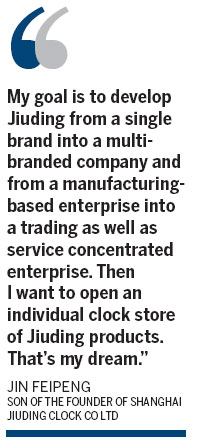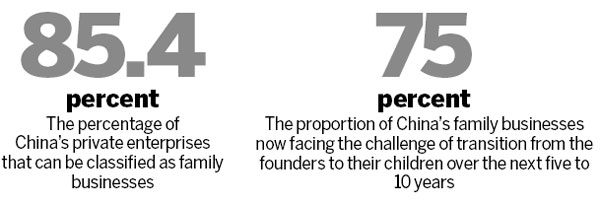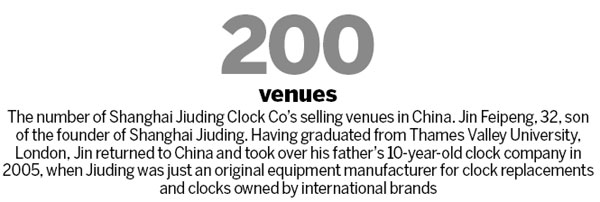Gen2 family firms look to world future
Updated: 2013-01-07 08:06
By Yu Ran in Shanghai (China Daily)
|
||||||||
|
As many as 75 percent of China's family enterprises will enter a period of transition from the founders to their children over the next five to 10 years. These young entrepreneurs are facing a huge challenge in taking over family brands and presenting them to the world. Gou Ben / For China Daily |
As founders start retirement, their successors deploy new, global tactics
With the majority of private enterprises in China faced with passing on the family business to the second generation, young entrepreneurs are facing a huge challenge in taking over family brands and presenting them to the world.
According to a report presented at the end of 2011 by the All-China Federation of Industry and Commerce, about 85.4 percent of China's private sector enterprises can be classified as family businesses. As many as 75 percent will enter a period of transition from the founders to their children over the next five to 10 years.
Huang Liwei, 35, was chosen to take over the business founded by his father in 1986. He started working as an ordinary employee there in 2003 and started running things after gaining thorough experience of the entire operation.
"It is extremely essential for a person from the second generation of a family business to work as a normal staff member for a certain period to get familiar with the whole production, sales and financing process before taking on a management role," said Huang, the general manager of Shanghai Yasi Electric Apparatus, a manufacturer of complete sets of high and low voltage electrical equipment with registered capital of $6.2 million.
Having graduated from Xiamen University with an executive master's in business administration, Huang had a different approach to running the business from his father, who had been exploring the domestic market over the past two decades and more.
Branching overseas

"I thought about taking Yasi out of China as a Chinese brand instead of staying as a local equipment maker as soon as possible when I took over the management of the company," said Huang.
After being appointed manager of the company in 2006, Huang started expanding the global market to cooperate with international brands to enhance production technology and ensure the quality of products.
Yasi cooperated with FKI Group, a British engineering and manufacturing company, in 2006 to produce a series of innovative electrical equipment by applying the materials, design models and techniques recommended by FKI.
One year later, a brand strategy agreement was signed between Yasi and ABB Group, the global leader in power and automation technologies, with joint production on certain items under the ABB brand.
"The company successfully obtained a good global reputation by producing promising quality products after learning from well-known global brands under joint production agreements, which was a good start for us," said Huang.
He added that insisting on manufacturing high-quality items with updated innovative technology is the only way to stand out among the tough competition in the field of low voltage electrical appliances.
Nevertheless, Huang is not just concentrating on making electrical products like his father. He is also making investments with global partners in profitable projects as a side business.
Huang bought a mine in Guangxi Zhuang autonomous region in 2011 and launched a company with Omya Group, a Swiss global leading supplier of white minerals, to exploit and develop calcium carbonate-related products.
"I would like to work on those investment projects with global leading companies to learn how to create an international brand and make money from it at the same time," said Huang.
It is a common vision for the future of private-owned family businesses to take their products to the world by working with overseas business partners.
It is an advantage that most of the younger generations of entrepreneurs have a related overseas educational background or work experience. It enables them to know more about how to go about entering the global market.
Study abroad
"Many young family members who were born in the 1970s or 1980s, had an overseas education, have different characteristics and enjoyed a comfortable life, unlike their parents," said Yu Mingyang, a professor at the China Enterprise Development Institute of Shanghai Jiao Tong University.
Jin Feipeng, for example, a 32-year-old Wenzhou-born son of the founder of Shanghai Jiuding Clock Co, transformed the family company from a basic manufacturer into a top brand in the world clock industry after taking over the business seven years ago.
Having graduated from Thames Valley University, London, Jin appears to have been born with a business mind, selling DVDs at weekend markets in London just one-month after he arrived at the age of 17.
Jin returned to China and took over his father's 10-year old clock company in 2005, when Jiuding was just an original equipment manufacturer (OEM) for clock replacements and clocks owned by international brands.
After working in the family company for more than two years, Jin realized that being an OEM was not the best future for the company so he dropped most of the OEM orders and started building Jiuding into a brand that could manufacture high-end clocks for the domestic market in 2008.
"I've successfully enabled 85 percent of our products to meet demand in the domestic market. Jiuding as a Chinese brand has now stepped on to the world stage, selling to the United States, Germany and certain Asian countries," said Jin.
Jiuding clocks feature original German mechanical movements combined with superior quality clock components in a solid wooden casing with a unique finish in a choice of colors.
Jiuding has more than 200 selling venues in China. It merged with a German clock brand as an acquisition and has legal ownership of brands from the US, Germany and Japan in the China market.
"My goal is to develop Jiuding from a single brand into a multi-branded company and from a manufacturing-based enterprise into a trading as well as service concentrated enterprise. Then I want to open an individual clock store of Jiuding products. That's my dream," said Jin.
Challenges
However, not every second-generation family business is as lucky as Huang and Jin, who have already tasted the fruits of harvest while a great many of their peers are still trying to take their family companies out of China.
"Given that the majority of second generation family businesspeople were born after 1980, they are not mature enough to apply what they learned abroad to the actual running of businesses quickly," said Yu, the professor from Shanghai Jiao Tong University.
Guan Yanqin, 27, is to take over the running of her father's pickle-making business in Meishan, Sichuan province, although she is young and not experienced enough to be a board member.
"I grew up in the plant and saw my parents working hard night and day.
"Their spirit certainly inspired me so I want to be in charge of the company and let them enjoy their retirement soon," said Guan.
Having graduated from London School of Economics in the UK with a master's degree, Guan started work at her parents' company after spending six months in Beijing working at an accounting firm.
During her five years of study in the UK, Guan successfully introduced the pickles made by her family business to local Chinese stores in her leisure time, persuading the stores to sell the products at discounted prices at the beginning.
"I started by visiting small grocery stores in Birmingham, where I studied for my bachelor's degree, and gradually expanded to Manchester and London," said Guan.
Guan is still trying to expand the pickle business out of Sichuan province and even China into other countries where Chinese people live.
"My pickle selling in the UK ended when I came back to China but I am planning to open some overseas offices and warehouses in Europe, the US and some Asian countries to promote our products properly," said Guan.
In the next decade, more second generations of family businesses will get ready to face the challenge. It will be a turning point for the real economy in China, which is mostly contributed to by massive privately owned family enterprises.
"Many small- and medium-sized enterprises will be operated by the younger generations soon after the fathers retire. It will be a new era for privately owned businesses in China," said Song Xiaohui, an officer with the Shanghai SME Development and Service Center.
Song added that the younger generations have the modern knowledge and great foresight to take their family businesses to the world with their open-minded strategies.
yuran@chinadaily.com.cn
|
More second generation Chinese family businesses will have to make a choice on whether they need to open overseas offices and warehouses in Europe, the US and some Asian countries to promote their products profitably. Gao Yuwen / For China Daily |


(China Daily 01/07/2013 page13)

 In Photos: 7.0-magnitude quake hits Sichuan
In Photos: 7.0-magnitude quake hits Sichuan
 Li Na on Time cover, makes influential 100 list
Li Na on Time cover, makes influential 100 list
 FBI releases photos of 2 Boston bombings suspects
FBI releases photos of 2 Boston bombings suspects
 World's wackiest hairstyles
World's wackiest hairstyles
 Sandstorms strike Northwest China
Sandstorms strike Northwest China
 Never-seen photos of Madonna on display
Never-seen photos of Madonna on display
 H7N9 outbreak linked to waterfowl migration
H7N9 outbreak linked to waterfowl migration
 Dozens feared dead in Texas plant blast
Dozens feared dead in Texas plant blast
Most Viewed
Editor's Picks

|

|

|

|

|

|
Today's Top News
Live report: 7.0-magnitude quake hits Sichuan, heavy casualties feared
Boston suspect cornered on boat
Cross-talk artist helps to spread the word
'Green' awareness levels drop in Beijing
Palace Museum spruces up
First couple on Time's list of most influential
H7N9 flu transmission studied
Trading channels 'need to broaden'
US Weekly

|

|









